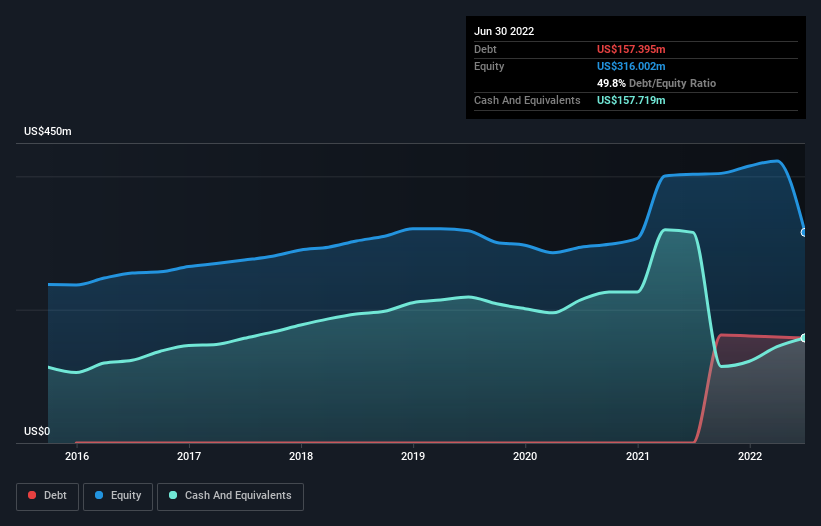- United States
- /
- Consumer Services
- /
- NasdaqGS:APEI
American Public Education (NASDAQ:APEI) Seems To Use Debt Quite Sensibly
Some say volatility, rather than debt, is the best way to think about risk as an investor, but Warren Buffett famously said that 'Volatility is far from synonymous with risk.' So it might be obvious that you need to consider debt, when you think about how risky any given stock is, because too much debt can sink a company. As with many other companies American Public Education, Inc. (NASDAQ:APEI) makes use of debt. But is this debt a concern to shareholders?
Why Does Debt Bring Risk?
Generally speaking, debt only becomes a real problem when a company can't easily pay it off, either by raising capital or with its own cash flow. Ultimately, if the company can't fulfill its legal obligations to repay debt, shareholders could walk away with nothing. However, a more frequent (but still costly) occurrence is where a company must issue shares at bargain-basement prices, permanently diluting shareholders, just to shore up its balance sheet. Having said that, the most common situation is where a company manages its debt reasonably well - and to its own advantage. When we examine debt levels, we first consider both cash and debt levels, together.
Check out our latest analysis for American Public Education
How Much Debt Does American Public Education Carry?
The image below, which you can click on for greater detail, shows that at June 2022 American Public Education had debt of US$157.4m, up from none in one year. However, its balance sheet shows it holds US$157.7m in cash, so it actually has US$324.0k net cash.

How Healthy Is American Public Education's Balance Sheet?
We can see from the most recent balance sheet that American Public Education had liabilities of US$95.1m falling due within a year, and liabilities of US$251.0m due beyond that. Offsetting these obligations, it had cash of US$157.7m as well as receivables valued at US$31.6m due within 12 months. So its liabilities outweigh the sum of its cash and (near-term) receivables by US$156.8m.
This is a mountain of leverage relative to its market capitalization of US$202.2m. This suggests shareholders would be heavily diluted if the company needed to shore up its balance sheet in a hurry. Despite its noteworthy liabilities, American Public Education boasts net cash, so it's fair to say it does not have a heavy debt load!
We saw American Public Education grow its EBIT by 8.5% in the last twelve months. Whilst that hardly knocks our socks off it is a positive when it comes to debt. There's no doubt that we learn most about debt from the balance sheet. But it is future earnings, more than anything, that will determine American Public Education's ability to maintain a healthy balance sheet going forward. So if you want to see what the professionals think, you might find this free report on analyst profit forecasts to be interesting.
But our final consideration is also important, because a company cannot pay debt with paper profits; it needs cold hard cash. While American Public Education has net cash on its balance sheet, it's still worth taking a look at its ability to convert earnings before interest and tax (EBIT) to free cash flow, to help us understand how quickly it is building (or eroding) that cash balance. Over the last three years, American Public Education actually produced more free cash flow than EBIT. That sort of strong cash conversion gets us as excited as the crowd when the beat drops at a Daft Punk concert.
Summing Up
While American Public Education does have more liabilities than liquid assets, it also has net cash of US$324.0k. The cherry on top was that in converted 113% of that EBIT to free cash flow, bringing in US$37m. So we don't have any problem with American Public Education's use of debt. We'd be motivated to research the stock further if we found out that American Public Education insiders have bought shares recently. If you would too, then you're in luck, since today we're sharing our list of reported insider transactions for free.
Of course, if you're the type of investor who prefers buying stocks without the burden of debt, then don't hesitate to discover our exclusive list of net cash growth stocks, today.
New: Manage All Your Stock Portfolios in One Place
We've created the ultimate portfolio companion for stock investors, and it's free.
• Connect an unlimited number of Portfolios and see your total in one currency
• Be alerted to new Warning Signs or Risks via email or mobile
• Track the Fair Value of your stocks
Have feedback on this article? Concerned about the content? Get in touch with us directly. Alternatively, email editorial-team (at) simplywallst.com.
This article by Simply Wall St is general in nature. We provide commentary based on historical data and analyst forecasts only using an unbiased methodology and our articles are not intended to be financial advice. It does not constitute a recommendation to buy or sell any stock, and does not take account of your objectives, or your financial situation. We aim to bring you long-term focused analysis driven by fundamental data. Note that our analysis may not factor in the latest price-sensitive company announcements or qualitative material. Simply Wall St has no position in any stocks mentioned.
About NasdaqGS:APEI
American Public Education
Provides online and campus-based postsecondary education and career learning in the United States.
Excellent balance sheet with proven track record.
Similar Companies
Market Insights
Community Narratives





